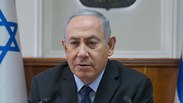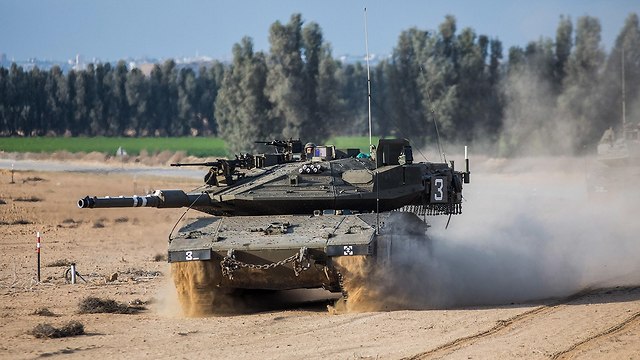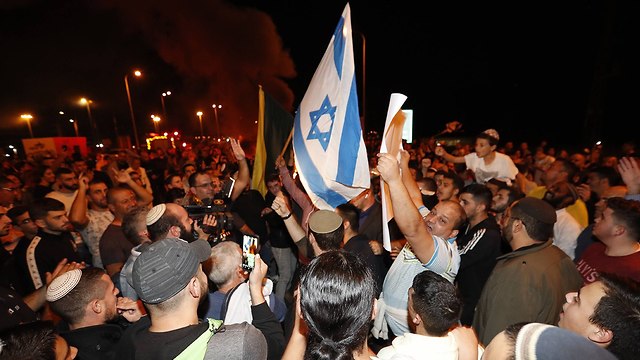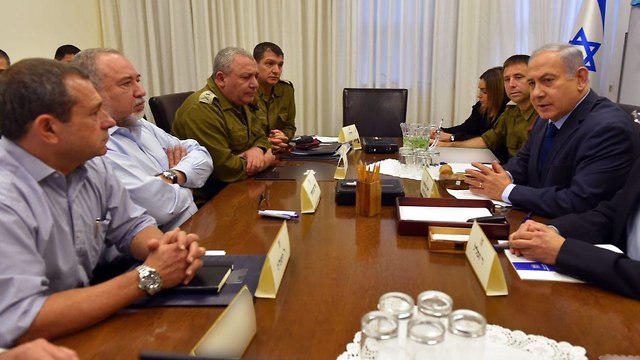
Israel with Hamas agreed to a ceasefire on Tuesday evening thanks to mediation efforts by Egypt and the United Nations after two days of fighting that saw over 400 rockets being fired from Gaza at Israel and heavy IDF bombardments in the strip in retaliation.
The ceasefire was approved by Prime Minister Benjamin Netanyahu despite opposition from some members of his Security Cabinet.
The Cabinet met for seven hours on Tuesday morning to discuss the latest flare-up of hostilities in the Gaza Strip. At the end of the meeting, the prime minister decided—without a vote—to adopt the defense establishment's recommendation to agree to a truce.
Some of the senior ministers complained that the prime minister had "imprisoned" them for many hours, while behind the scenes he worked to achieve the ceasefire agreement he wanted. To avoid paying a political price for agreeing to the ceasefire, Netanyahu apparently worked to create the impression the entire Cabinet supported the move.
The ministers claimed Netanyahu "engineered" the discussion by having the heads of the defense establishment—IDF Chief of Staff Gadi Eisenkot, Military Intelligence Directorate head Tamir Heyman, Shin Bet Director Nadav Argaman, Mossad Director Yossi Cohen and National Security Advisor Meir Ben Shabbat—all present the same position: at this time, Israel should stop its attacks in Gaza and accept Egypt's request to give another chance for the arrangement with Hamas.
During the meeting, the defense officials described the event that led to the current escalation: the botched secret IDF mission deep inside the Gaza Strip, in which IDF Lt. Col. M. and 7-10 Hamas fighters were killed. They argued that Hamas was not revealing the names of some of its fighters that were killed as the terror group was deeply embarrassed by an incident it sees as a violation of the truce reached a week ago.
Hamas fired almost 500 rockets, with most falling in open areas, over 120 intercepted by Iron Dome and some hitting residential areas, causing damage, injuries and one death. On the other hand, the IDF struck 160 targets in Gaza, including the Hamas internal security building and the organization's television station. The IDF presented pictures and videos from the attacks at the meeting.
The defense officials said that if Israel continues its attacks in Gaza, the Palestinian factions in the strip could extend the range of their rocket fire all the way to Tel Aviv.
"The question being asked is what do we want to achieve. If you want war and occupation, that's one thing. But if you think you have other more important strategic tasks, and you think a solution in the form of an arrangement is the right one—then you should stick to it," a defense official said. "Had we continued with the strikes, it would've forced us to go all the way. To deliver another blow and get rocket fire on Tel Aviv, and then ask ourselves why didn't we stop when the time was right."
Some Cabinet ministers claimed that none of the ministers objected to a cease fire. Ministers Avigdor Lieberman, Naftali Bennett, Ayelet Shaked and Ze'ev Elkin all later denied that claim, with the defense minister calling it "fake news" and insisting his position remained consistent.
So what really happened?
Conversations with senior officials indicate that after the heads of the defense establishment presented their unequivocal stance in favor of a ceasefire, each of the ministers were given the floor.
Netanyahu, along with ministers Yisrael Katz, Yoav Galant, Gilad Erdan, Aryeh Deri, Moshe Kahlon and Yuval Steinitz, supported a ceasefire, while ministers Lieberman, Bennett, Shaked and Elkin were united in their opposition to a truce in the form of "quiet for quiet," claiming it would allow Hamas to continue arming itself. Lieberman proposed to continue inflicting heavy blows on Hamas, while Bennett presented an operational plan.
Some ministers also criticized the fact that the heads of the defense establishment did not present sufficient alternative options for action in Gaza, and rather insisted on accepting the ceasefire.
However, there was no vote on the matter, and the discussion ended with Netanyahu's concluding remarks in which he adopted the defense establishment's recommendation. Since none of the ministers insisted on voting, close associates of the prime minister insisted this meant all those present supported the ceasefire.
Senior cabinet officials claimed Netanyahu had already made his decision even before the Cabinet meeting and only held the meeting in an effort to put some of the responsibility on the other ministers. Some of the ministers further asserted that had there been a vote, the results would have been seven against the ceasefire and four in favor.
The Prime Minister's Office said that "at the cabinet meeting, all the members of the cabinet expressed their views in a free and detailed manner, it was documented. True leaders don't say one thing in the Cabinet and saying the opposite outside."
Earlier in the day, Israeli officials claimed Jerusalem was ignoring mediation efforts by Egypt and the UN, and that "there is no talk of a ceasefire," but Western diplomats insisted mediation talks had not stopped at any moment.
And so, other than confirming the ceasefire, an Israeli official said following the Cabinet meeting that "Israel reserves its freedom of action. Hamas requests for a ceasefire came from four different mediators, and Israel has responded that events on the ground will be the determining factor."
The mediators included Egypt, the UN Secretary-General's envoy to the Middle East Nickolay Mladenov, Qatar and Norway. Oman apparently also offered its help.




















